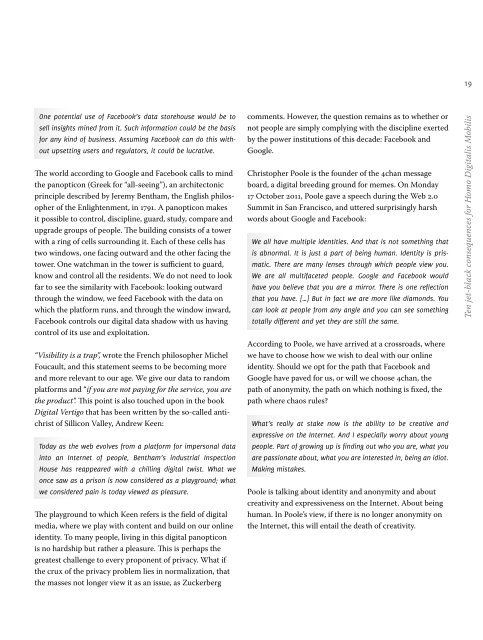VINT-The-Dark-Side-of-Social-Media-Alarm-Bells-Analysis-and-the-Way-Out
VINT-The-Dark-Side-of-Social-Media-Alarm-Bells-Analysis-and-the-Way-Out
VINT-The-Dark-Side-of-Social-Media-Alarm-Bells-Analysis-and-the-Way-Out
You also want an ePaper? Increase the reach of your titles
YUMPU automatically turns print PDFs into web optimized ePapers that Google loves.
One potential use <strong>of</strong> Facebook’s data storehouse would be to<br />
sell insights mined from it. Such information could be <strong>the</strong> basis<br />
for any kind <strong>of</strong> business. Assuming Facebook can do this without<br />
upsetting users <strong>and</strong> regulators, it could be lucrative.<br />
<strong>The</strong> world according to Google <strong>and</strong> Facebook calls to mind<br />
<strong>the</strong> panopticon (Greek for “all-seeing”), an architectonic<br />
principle described by Jeremy Bentham, <strong>the</strong> English philosopher<br />
<strong>of</strong> <strong>the</strong> Enlightenment, in 1791. A panopticon makes<br />
it possible to control, discipline, guard, study, compare <strong>and</strong><br />
upgrade groups <strong>of</strong> people. <strong>The</strong> building consists <strong>of</strong> a tower<br />
with a ring <strong>of</strong> cells surrounding it. Each <strong>of</strong> <strong>the</strong>se cells has<br />
two windows, one facing outward <strong>and</strong> <strong>the</strong> o<strong>the</strong>r facing <strong>the</strong><br />
tower. One watchman in <strong>the</strong> tower is sufficient to guard,<br />
know <strong>and</strong> control all <strong>the</strong> residents. We do not need to look<br />
far to see <strong>the</strong> similarity with Facebook: looking outward<br />
through <strong>the</strong> window, we feed Facebook with <strong>the</strong> data on<br />
which <strong>the</strong> platform runs, <strong>and</strong> through <strong>the</strong> window inward,<br />
Facebook controls our digital data shadow with us having<br />
control <strong>of</strong> its use <strong>and</strong> exploitation.<br />
“Visibility is a trap”, wrote <strong>the</strong> French philosopher Michel<br />
Foucault, <strong>and</strong> this statement seems to be becoming more<br />
<strong>and</strong> more relevant to our age. We give our data to r<strong>and</strong>om<br />
platforms <strong>and</strong> “if you are not paying for <strong>the</strong> service, you are<br />
<strong>the</strong> product”. This point is also touched upon in <strong>the</strong> book<br />
Digital Vertigo that has been written by <strong>the</strong> so-called antichrist<br />
<strong>of</strong> Sillicon Valley, Andrew Keen:<br />
Today as <strong>the</strong> web evolves from a platform for impersonal data<br />
into an Internet <strong>of</strong> people, Bentham’s industrial Inspection<br />
House has reappeared with a chilling digital twist. What we<br />
once saw as a prison is now considered as a playground; what<br />
we considered pain is today viewed as pleasure.<br />
<strong>The</strong> playground to which Keen refers is <strong>the</strong> field <strong>of</strong> digital<br />
media, where we play with content <strong>and</strong> build on our online<br />
identity. To many people, living in this digital panopticon<br />
is no hardship but ra<strong>the</strong>r a pleasure. This is perhaps <strong>the</strong><br />
greatest challenge to every proponent <strong>of</strong> privacy. What if<br />
<strong>the</strong> crux <strong>of</strong> <strong>the</strong> privacy problem lies in normalization, that<br />
<strong>the</strong> masses not longer view it as an issue, as Zuckerberg<br />
comments. However, <strong>the</strong> question remains as to whe<strong>the</strong>r or<br />
not people are simply complying with <strong>the</strong> discipline exerted<br />
by <strong>the</strong> power institutions <strong>of</strong> this decade: Facebook <strong>and</strong><br />
Google.<br />
Christopher Poole is <strong>the</strong> founder <strong>of</strong> <strong>the</strong> 4chan message<br />
board, a digital breeding ground for memes. On Monday<br />
17 October 2011, Poole gave a speech during <strong>the</strong> Web 2.0<br />
Summit in San Francisco, <strong>and</strong> uttered surprisingly harsh<br />
words about Google <strong>and</strong> Facebook:<br />
We all have multiple identities. And that is not something that<br />
is abnormal. It is just a part <strong>of</strong> being human. Identity is prismatic.<br />
<strong>The</strong>re are many lenses through which people view you.<br />
We are all multifaceted people. Google <strong>and</strong> Facebook would<br />
have you believe that you are a mirror. <strong>The</strong>re is one reflection<br />
that you have. […] But in fact we are more like diamonds. You<br />
can look at people from any angle <strong>and</strong> you can see something<br />
totally different <strong>and</strong> yet <strong>the</strong>y are still <strong>the</strong> same.<br />
According to Poole, we have arrived at a crossroads, where<br />
we have to choose how we wish to deal with our online<br />
identity. Should we opt for <strong>the</strong> path that Facebook <strong>and</strong><br />
Google have paved for us, or will we choose 4chan, <strong>the</strong><br />
path <strong>of</strong> anonymity, <strong>the</strong> path on which nothing is fixed, <strong>the</strong><br />
path where chaos rules?<br />
What’s really at stake now is <strong>the</strong> ability to be creative <strong>and</strong><br />
expressive on <strong>the</strong> Internet. And I especially worry about young<br />
people. Part <strong>of</strong> growing up is finding out who you are, what you<br />
are passionate about, what you are interested in, being an idiot.<br />
Making mistakes.<br />
Poole is talking about identity <strong>and</strong> anonymity <strong>and</strong> about<br />
creativity <strong>and</strong> expressiveness on <strong>the</strong> Internet. About being<br />
human. In Poole’s view, if <strong>the</strong>re is no longer anonymity on<br />
<strong>the</strong> Internet, this will entail <strong>the</strong> death <strong>of</strong> creativity.<br />
19<br />
ten jet-black consequences for homo Digitalis Mobilis


